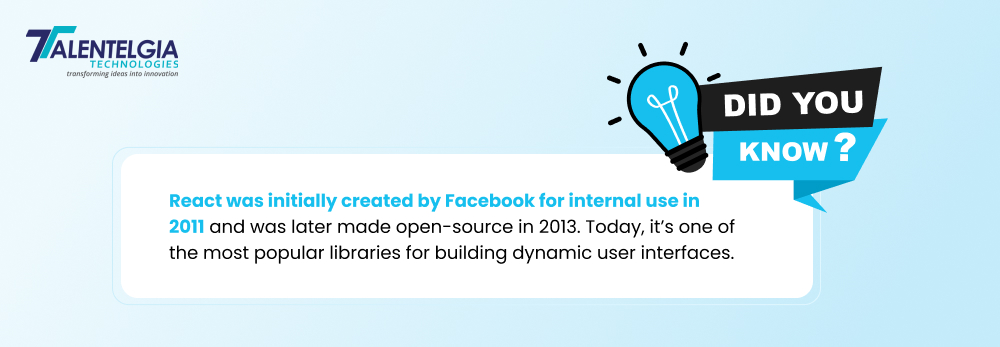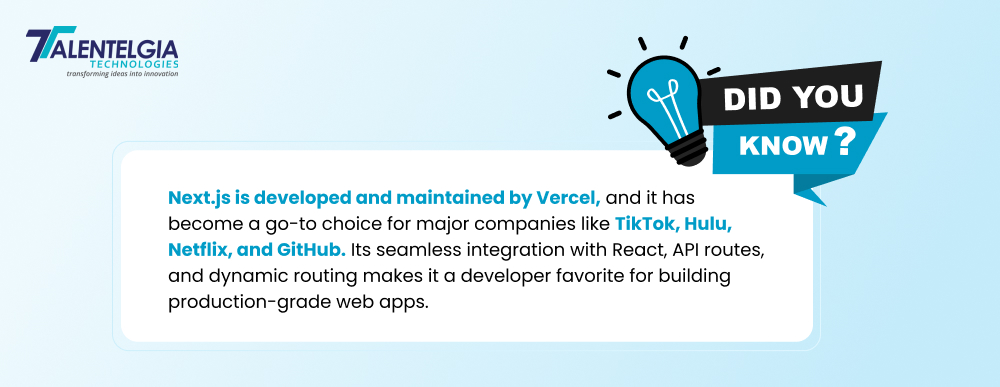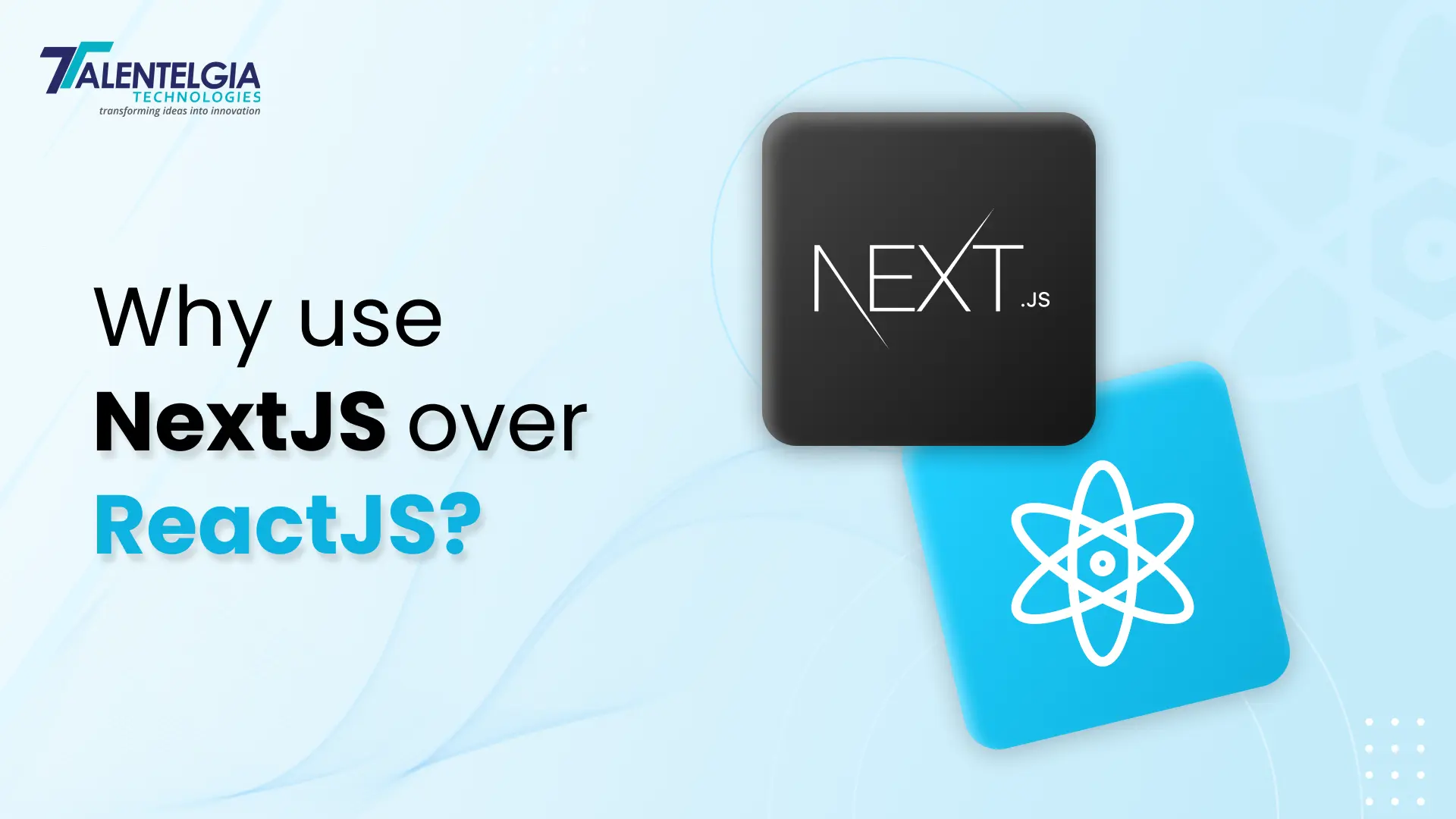In today’s fast-paced digital world, developers and businesses constantly seek tools and technologies that streamline processes and enhance user experiences. Among the top contenders in the JavaScript ecosystem are React.js and Next.js. Both have revolutionized web development, but understanding their differences and determining when to use one over the other can significantly impact your project’s success.
Choosing the right technology between ReactJS and Next.js for a developer depends on factors such as ease of use, flexibility, and efficiency. Before starting development, one must choose between the two, which can be confusing. This raises the question:
“Why use Next.js over ReactJS for web development?”
In this blog, you’ll figure out why one can opt for NextJS over ReactJS. Let’s Start!
Defining Next.js and React.js
React.js, developed by Facebook, is a popular JavaScript library primarily used for building interactive and dynamic user interfaces (UIs). Introduced in 2013, React.js brought a component-based approach to front-end development, making it easier for developers to create reusable UI components. Over time, it has become a cornerstone for single-page applications (SPAs) and dynamic web development.
On the other hand, Next.js is a React-based framework developed by Vercel (formerly ZEIT) in 2016. Though it is built on React’s core principles, Next.js provides additional tools and features that make implementing server-side rendering (SSR), static site generation (SSG), and other modern development requirements easier. In short, Next.js is the next step in React, solving many of the problems developers face when building scalable and SEO-friendly web applications.
React.js: Advantages & Disadvantages

Advantages of React.js
Let’s explore the key advantages that attract Reactjs developers. Faster rendering of web applications and reusable components are powerful features that simplify development and provide an enhanced experience for the user. Below mentioned are some of the advantages :
1. Component-Based Architecture
React.js allows developers to decompose the user interface into smaller, reusable components, which can be independently developed and combined for faster and more modular development. This form of architecture reduces code duplication while improving readability and making debugging or enhancing specific parts easier.
2. Virtual DOM for Performance Optimization
React utilizes the Virtual DOM to make efficient updates and render only the necessary components. Unlike other systems, the whole UI is not rendered; React compares the Virtual DOM with the real DOM and applies the fewest updates, making dynamic applications perform faster.
3. Rich Ecosystem and Libraries
React has a strong ecosystem with innumerable third-party libraries and tools that can tackle almost every need in development. Libraries like Redux, React Router, and Material-UI are great solutions for state management, routing, and UI design. This makes it highly versatile for developers.
4. Strong Community and Support
With widespread adoption, React has a huge community of developers, which ensures regular updates, a wealth of resources, and quick troubleshooting for common issues. Tutorials, documentation, and open-source contributions make learning and working with React easier for newcomers and experienced developers alike.
5. Cross-Platform Development
React’s principles can even be applied to web development. Tools like React Native development help developers create mobile apps for iOS and Android. This can save time and even resources since one can use this knowledge base.
6. Flexibility
React can be used for any form of project, from smaller applications to even enterprise-level systems. Since it is a library-only nature, developers have the liberty to customize and combine it with other technologies effortlessly.
Disadvantages of React.js
Let’s take a closer look at the drawbacks of React.js to understand where it might go wrong. Although React.js is all about efficiency and flexibility, below are some constraints that developers should be aware of before starting a project:
1. Steep Learning Curve for Beginners
React introduces things like JSX – a syntax extension for writing HTML-like code in JavaScript, lifecycle methods, and hooks that can get pretty overwhelming for the beginner, and state management and hierarchical component structures need time to learn and understand.
2. Requires Additional Libraries
React is a library and not a complete framework. Such functionalities like routing, API calls, and state management need to be included by other third-party tools such as React Router, Axios, and Redux. This complicates development and makes the learning curve harder.
3. SEO Limitations
The default CSR of React will impact search engine optimization. Server-side rendering will be missed without which web crawlers cannot index dynamic content well. The application would lose its visibility in the search engines.
4. Frequent Updates
React’s fast-paced evolution, while beneficial in some ways, can be challenging for developers to keep up with. Frequent updates and new features may lead to inconsistencies in older projects.
5. Poor Initial Loading Performance
In CSR, a blank HTML page is downloaded in the browser and loads all the JavaScript, then proceeds to render content. It may, therefore, result in slower first page load times, which can be worse for more extensive applications and thus compromise user experience.
Next.js: Advantages & Disadvantages
Advantages of Next.js
Let’s examine the advantages of Next.js to understand why it has become such a game-changer in modern web development. Among some great features that are involved here are server-side rendering, static site generation, and also optimal performance to make building fast, SEO-friendly, and scalable web applications very simple:
1. Server-Side Rendering (SSR) for Better SEO
Next.js renders pages on the server so that search engines can crawl and index this content easily. That is what makes Next.js such a powerful solution for applications where SEO is highly important, like blogs marketing sites, or perhaps even e-commerce platforms.
2. Static Site Generation (SSG) for Speed
Next.js can pre-build pages at build time; this creates static HTML files that load instantly. This makes it perfect for sites with not frequently change the content as it saves server load and gives lightning-fast performance.
3. Automatic Code Splitting
With automatic code splitting, Next.js will only load the JavaScript and CSS as needed for the current page. This optimization reduces initial loading times and improves the performance of large applications, making a smoother user experience.
4. File-Based Routing System
It supports a nice, intuitive file-based routing system. Developers can define routes easily with just folders and files instead of libraries like React Router. Moreover, dynamic routes are implemented easily, which streamlines navigation in applications.
5. Built-In API Routes
Next.js facilitates developers to have serverless API endpoints right into the application that can cut out the need for a separate backend and simplify the process of implementing backend functionality such as fetching or storing data.
6. Improved Developer Experience
Next.js supports features like HMR and TypeScript by default. HMR allows developers to update in real-time, without having to refresh the page, thus accelerating the development cycle. All these tools enable developers to code more efficiently and smoothly.
7. Universal Rendering Options
Next.js provides four rendering options: CSR, SSR, SSG, and ISR. This flexibility allows developers to use the best approach for different parts of their application according to performance, SEO, and scalability requirements.
Disadvantages of Next.js
Let’s consider the disadvantages of Next.js to understand some of the challenges it brings. Even though Next.js is applauded for its speed, SEO benefits, and server-side rendering, it has its limitations that developers should be aware of before starting a project:
1. Steeper Learning Curve
Developers with experience in React may not understand the new features introduced by Next.js, such as SSR, SSG, and ISR. These features require a new mindset and learning to use them.
2. Opinionated Structure
Next.js enforces some conventions like file-based routing that may not fit the developers who want the most customizable setups. This opinionated structure feels restrictive in certain use cases.
3. Increased Complexity
While Next.js streamlines many things in development, additional features can introduce unnecessary complexity to the application. For instance, server-side code and pre-rendering logic must be managed, and that might overwhelm small projects or less experienced teams.
4. Larger Bundle Sizes
The extensive feature set in Next.js may lead to larger JavaScript bundle sizes compared to a basic React.js application. This may impact performance in some cases unless well-optimized.
5. Limited Plugins and Extensions
Compared to the vast ecosystem of React, Next.js has a much smaller range of plugins and tools. While the framework covers most features out of the box, developers may hit a limitation when working on very specific or niche requirements.
Understanding the strengths and weaknesses of React.js and Next.js allows developers to make the right decision ‘Why Use Next.js Over React.js?’ about which tool best fits their project. Both have their unique advantages, but the additional features of Next.js often make it the preferred choice for modern web applications focused on SEO, performance, and scalability.
Why Use Next.js Over React.js?

Though flexible and great for dynamically developing SPAs with React.js, Next.js brings to modern web applications some convincing arguments in its favor:
- Improved SEO: Next.js boosts the SEO of websites drastically as it supports server-side rendering and static site generation for any content-driven sites or e-commerce sites.
- Out-of-the-Box Features: While Next.js offers its set of built-in routing, API handling, and performance optimizations out-of-the-box, third-party libraries and configurations are usually unnecessary in most cases with React.js.
- Scalability: For projects expected to scale, Next.js offers tools for server-side rendering and caching, making it easier to manage growing traffic and content.
- Faster Development: Tools in the framework streamline the development process, saving developers time and effort.
- Better User Experience: With the pre-rendering of pages, Next.js provides faster page loads and smoother interactions, improving user experience.
Next.js vs. React.js: Major Key Differences
| React.js | Next.js |
| Rendering Approach: Primarily uses Client-Side Rendering (CSR), which can lead to slower initial load times and weaker SEO. | Rendering Approach: Supports multiple methods like Server-Side Rendering (SSR), Static Site Generation (SSG), and Incremental Static Regeneration (ISR) for better performance and SEO. |
| Routing: Requires external libraries like React Router for navigation, adding complexity to setup. | Routing: Includes a built-in file-based routing system, simplifying navigation and reducing dependencies. |
| Performance: CSR may cause slower initial page loads, especially for large applications with dynamic content. | Performance: Features like automatic code splitting and optimized rendering ensure faster page loads and better overall performance. |
| Flexibility: Highly customizable but relies on additional libraries and tools for state management, routing, and API handling. | Flexibility: Comes with pre-configured features, making development streamlined but slightly more opinionated. |
| SEO: Limited SEO optimization due to CSR unless SSR is implemented manually. | SEO: Superior SEO capabilities thanks to built-in SSR and SSG options. |
| Complexity: Requires manual configuration and integration of multiple tools, which can increase development effort. | Complexity: Provides out-of-the-box features, reducing setup time and making it easier for developers to focus on the core application. |
Conclusion
Both React.js and Next.js are great tools in the JavaScript ecosystem, serving different needs. While React.js fits the bill for developers who would like flexibility and to build extensive SPAs with lots of interactivity, Next.js is a clear winner in projects prioritizing performance, SEO, and scalability.
With Next.js, developers immediately get server-side rendering, static site generation, and optimization out of the box while avoiding the headache of having to integrate multiple libraries to achieve modern application robustness. Sure, React.js may continue to be a good answer for certain use cases; however, Next.js provides that holistic solution that solves many issues developers face today.
Ultimately, the decision between React.js and Next.js depends on your project requirements and goals. If SEO, performance, and scalability are your top priorities, Next.js should be your go-to framework.


 Healthcare App Development Services
Healthcare App Development Services
 Real Estate Web Development Services
Real Estate Web Development Services
 E-Commerce App Development Services
E-Commerce App Development Services E-Commerce Web Development Services
E-Commerce Web Development Services Blockchain E-commerce Development Company
Blockchain E-commerce Development Company
 Fintech App Development Services
Fintech App Development Services Fintech Web Development
Fintech Web Development Blockchain Fintech Development Company
Blockchain Fintech Development Company
 E-Learning App Development Services
E-Learning App Development Services
 Restaurant App Development Company
Restaurant App Development Company
 Mobile Game Development Company
Mobile Game Development Company
 Travel App Development Company
Travel App Development Company
 Automotive Web Design
Automotive Web Design
 AI Traffic Management System
AI Traffic Management System
 AI Inventory Management Software
AI Inventory Management Software
 AI Software Development
AI Software Development  AI Development Company
AI Development Company  AI App Development Services
AI App Development Services  ChatGPT integration services
ChatGPT integration services  AI Integration Services
AI Integration Services  Generative AI Development Services
Generative AI Development Services  Natural Language Processing Company
Natural Language Processing Company Machine Learning Development
Machine Learning Development  Machine learning consulting services
Machine learning consulting services  Blockchain Development
Blockchain Development  Blockchain Software Development
Blockchain Software Development  Smart Contract Development Company
Smart Contract Development Company  NFT Marketplace Development Services
NFT Marketplace Development Services  Asset Tokenization Company
Asset Tokenization Company DeFi Wallet Development Company
DeFi Wallet Development Company Mobile App Development
Mobile App Development  IOS App Development
IOS App Development  Android App Development
Android App Development  Cross-Platform App Development
Cross-Platform App Development  Augmented Reality (AR) App Development
Augmented Reality (AR) App Development  Virtual Reality (VR) App Development
Virtual Reality (VR) App Development  Web App Development
Web App Development  SaaS App Development
SaaS App Development Flutter
Flutter  React Native
React Native  Swift (IOS)
Swift (IOS)  Kotlin (Android)
Kotlin (Android)  Mean Stack Development
Mean Stack Development  AngularJS Development
AngularJS Development  MongoDB Development
MongoDB Development  Nodejs Development
Nodejs Development  Database Development
Database Development Ruby on Rails Development
Ruby on Rails Development Expressjs Development
Expressjs Development  Full Stack Development
Full Stack Development  Web Development Services
Web Development Services  Laravel Development
Laravel Development  LAMP Development
LAMP Development  Custom PHP Development
Custom PHP Development  .Net Development
.Net Development  User Experience Design Services
User Experience Design Services  User Interface Design Services
User Interface Design Services  Automated Testing
Automated Testing  Manual Testing
Manual Testing  Digital Marketing Services
Digital Marketing Services 
 Ride-Sharing And Taxi Services
Ride-Sharing And Taxi Services Food Delivery Services
Food Delivery Services Grocery Delivery Services
Grocery Delivery Services Transportation And Logistics
Transportation And Logistics Car Wash App
Car Wash App Home Services App
Home Services App ERP Development Services
ERP Development Services CMS Development Services
CMS Development Services LMS Development
LMS Development CRM Development
CRM Development DevOps Development Services
DevOps Development Services AI Business Solutions
AI Business Solutions AI Cloud Solutions
AI Cloud Solutions AI Chatbot Development
AI Chatbot Development API Development
API Development Blockchain Product Development
Blockchain Product Development Cryptocurrency Wallet Development
Cryptocurrency Wallet Development About Talentelgia
About Talentelgia  Our Team
Our Team  Our Culture
Our Culture 
 Healthcare App Development Services
Healthcare App Development Services Real Estate Web Development Services
Real Estate Web Development Services E-Commerce App Development Services
E-Commerce App Development Services E-Commerce Web Development Services
E-Commerce Web Development Services Blockchain E-commerce
Development Company
Blockchain E-commerce
Development Company Fintech App Development Services
Fintech App Development Services Finance Web Development
Finance Web Development Blockchain Fintech
Development Company
Blockchain Fintech
Development Company E-Learning App Development Services
E-Learning App Development Services Restaurant App Development Company
Restaurant App Development Company Mobile Game Development Company
Mobile Game Development Company Travel App Development Company
Travel App Development Company Automotive Web Design
Automotive Web Design AI Traffic Management System
AI Traffic Management System AI Inventory Management Software
AI Inventory Management Software AI Software Development
AI Software Development AI Development Company
AI Development Company ChatGPT integration services
ChatGPT integration services AI Integration Services
AI Integration Services Machine Learning Development
Machine Learning Development Machine learning consulting services
Machine learning consulting services Blockchain Development
Blockchain Development Blockchain Software Development
Blockchain Software Development Smart contract development company
Smart contract development company NFT marketplace development services
NFT marketplace development services IOS App Development
IOS App Development Android App Development
Android App Development Cross-Platform App Development
Cross-Platform App Development Augmented Reality (AR) App
Development
Augmented Reality (AR) App
Development Virtual Reality (VR) App Development
Virtual Reality (VR) App Development Web App Development
Web App Development Flutter
Flutter React
Native
React
Native Swift
(IOS)
Swift
(IOS) Kotlin (Android)
Kotlin (Android) MEAN Stack Development
MEAN Stack Development AngularJS Development
AngularJS Development MongoDB Development
MongoDB Development Nodejs Development
Nodejs Development Database development services
Database development services Ruby on Rails Development services
Ruby on Rails Development services Expressjs Development
Expressjs Development Full Stack Development
Full Stack Development Web Development Services
Web Development Services Laravel Development
Laravel Development LAMP
Development
LAMP
Development Custom PHP Development
Custom PHP Development User Experience Design Services
User Experience Design Services User Interface Design Services
User Interface Design Services Automated Testing
Automated Testing Manual
Testing
Manual
Testing About Talentelgia
About Talentelgia Our Team
Our Team Our Culture
Our Culture

















 Write us on:
Write us on:  Business queries:
Business queries:  HR:
HR: 





